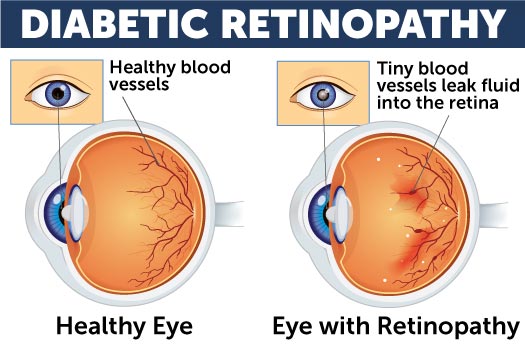Diabetic Eye Disease & Treatment
Diabetes is the leading cause of permanent blindness in working age adults in the United States. Diabetic eye disease is a group of eye problems that may affect people with diabetes. This group includes diabetic retinopathy, diabetic macular edema (DME), cataracts and glaucoma. Over time, people with diabetes are susceptible to damage of the eye leading to poor vision or even blindness.
 Early in the disease, diabetes can damage tiny blood vessels that supply the retina, the important light-sensing tissue of the eye (non-proliferative diabetic retinopathy). Damaged blood vessels can leak fluid into the retina and cause swelling of the central retina (diabetic macular edema or DME) leading to blurred or distorted vision.
Early in the disease, diabetes can damage tiny blood vessels that supply the retina, the important light-sensing tissue of the eye (non-proliferative diabetic retinopathy). Damaged blood vessels can leak fluid into the retina and cause swelling of the central retina (diabetic macular edema or DME) leading to blurred or distorted vision.
In some cases, the tiny blood vessels become blocked causing poor blood flow (ischemia). As the eye becomes sick from poor blood flow, abnormal new blood vessels (neovascularization) can grow in the eye (proliferative diabetic retinopathy). These abnormal blood vessels can bleed into the eye (vitreous hemorrhage), cause high eye pressures (glaucoma), and create scar tissue that can detach the retina. In some cases, diabetes can damage the retina preventing it from performing its normal function.
Is Eye Damage from Diabetes Reversible?
Damage from diabetes can in fact cause permanent vision loss that cannot be fixed with glasses, contact lenses, medicines or surgery. The presence and severity of diabetic retinopathy are related to the duration of diabetes and the level of diabetic control. Keeping the diabetes under control is the key to avoiding and managing diabetic eye disease.
What are Signs and Symptoms of Diabetic Eye Disease?
Many individuals who have diabetic eye disease have normal vision and no symptoms. Unfortunately, symptoms of diabetic eye disease usually occur in the later stages of the disease. The symptoms of diabetic retinopathy can include:
If you are diabetic and have any of these symptoms you should be evaluated by your eye doctor to see if further treatment from a diabetic retinopathy doctor or retina specialist is needed.
Learn more about how diabetes could affect your vision from the retina experts at Wolfe Eye Clinic.
How are Diabetic Eye Diseases treated?
Diabetic eye disease treatments can vary based upon individual patient’s conditions. All diabetics are at risk for diabetic eye disease making screening very important. According to the American Academy of Ophthalmology, 95% of those with significant diabetic retinopathy can avoid substantial vision loss if they are treated in time. Early detection is why it is so important for diabetics to have a dilated eye exam with their eye doctor at least once a year. You will be referred to a retina specialist if your eye doctor believes that your vision may be compromised by the diabetic eye disease.
What is the Best Treatment for Diabetic Retinopathy?
It is important to know that each patient is different, and diabetes can affect eyes in different ways. The first step in treatment for all people with diabetic eye disease is to work with their primary care provider to optimize control of blood sugar, blood pressure, and cholesterol. By controlling the diabetes, it will help to prevent further damage to the retina over time. It is also important that all patients with diabetes have a yearly dilated eye exam with their primary eye doctor to monitor for changes.
Sight threatening diabetic retinopathy should be treated by a fellowship-trained retina specialist who will carefully examine your dilated eyes and use photographs  to come up with a treatment plan. The photographs could include an optical coherence tomography (OCT) test which is a scan that provides images of the retina and a fluorescein angiogram (FA) to assess blood vessels and blood flow. Your retina specialist will partner with your general eye doctor to provide the care you need for your diabetic eye disease. At Wolfe Eye Clinic, our retina specialists in Iowa work with eye doctors around the state to manage care for many patients with various conditions of the retina.
to come up with a treatment plan. The photographs could include an optical coherence tomography (OCT) test which is a scan that provides images of the retina and a fluorescein angiogram (FA) to assess blood vessels and blood flow. Your retina specialist will partner with your general eye doctor to provide the care you need for your diabetic eye disease. At Wolfe Eye Clinic, our retina specialists in Iowa work with eye doctors around the state to manage care for many patients with various conditions of the retina.
Can diabetic retinopathy go away?
This is a common question a diabetic eye disease patient may ask and without the appropriate diabetic eye disease treatment, diabetic retinopathy is a chronic, slowly progressive disease that leads to vision loss over time. However, with excellent control of blood sugar, blood pressure, cholesterol and timely treatment of the retinopathy, the disease can be stopped and oftentimes reversed. Early recognition of the retinopathy and a cooperative effort between the patient, diabetic retinopathy doctor, and eye doctor(s) is key to preventing blindness from diabetes.
Injections for Diabetic Eye Disease
The most common diabetic eye disease treatment is an injection of medication into the eye. These injections sound scary but are painless and usually well tolerated. These injections deliver medicine inside the eye near the retina to block harmful signals that cause both blood vessel leakage and growth of abnormal blood vessels. When injection treatment is started the injections are often given monthly. In some cases, depending on the response to the treatment, your eye injections can be spaced out.
The goal of this diabetic eye disease treatment is to keep the disease under control with the least amount of treatment possible. In most cases long-term injection treatment is needed to control the disease and preserve vision. The medications are effective in reversing or controlling your diabetic eye disease but cannot cure your diabetic eye disease. Many of the retina specialists in Iowa at Wolfe Eye Clinic work with patients as part of national clinical trials to test new injectable medications.
Learn More About Intravitreal Injections
Laser Treatment for Diabetic Eye Disease
In some cases, diabetic eye disease is treated with a laser. Laser is a concentrated form of light which can be used to seal leaking blood vessels or treat sick areas of the retina to prevent growth of abnormal blood vessels. Laser treatments are performed in the retina offices at Wolfe Eye Clinic and often used in conjunction with injection therapy.
Surgery for Diabetic Eye Disease
Surgery for diabetic eye disease, such as a vitrectomy, may be needed in some cases to remove blood or traction on the retina from scar tissue. Surgery is performed under sedation in a special operating room in our state-of-the-art Wolfe Surgery Center in Des Moines, or at a trusted hospital partner’s location around the state of Iowa without any need to stay overnight in a hospital. In some cases, your doctor will perform laser treatment, inject medicine, or use a gas bubble to hold the retina in place after surgery. For many patients, surgical treatments can be successful at improving and preserving vision. It is important to discuss all diabetic eye disease treatment options that apply to your condition with a retina specialist at Wolfe Eye Clinic.
Wolfe Eye Clinic Specialists Participating in Retina Clinical Trials
Our retina specialists are actively involved in advancing treatments to improve outcomes and reduce treatment burdens for individuals with diabetic eye disease. If appropriate, your retina specialist will discuss possible participation in one of the current clinical trials that is accepting participants and working to help people with diabetic eye disease. Our Iowa retina specialists are up to date on all the possible treatment options and will help educate and guide you in choosing what’s right for you. At Wolfe Eye Clinic, our retina specialists bring years of experience, advanced training, and skill to each patient we care for.
Find a Diabetic Retinopathy Doctor Near You
Many diabetic patients ask, what kind of eye doctor should a diabetic see? As a diabetic, an annual dilated eye exam with your regular optometrist or ophthalmologist is very important. However, if you have questions or experience vision change in correlation to your diabetes, seeing a retina doctor in Iowa at Wolfe Eye Clinic is highly recommended. Our retina physicians in Iowa specialize in the medical and surgical treatment options for a variety of retina diseases, including diabetic eye disease.
In most cases, it is best to have a referral from your primary care doctor or your optometrist to see a retina specialist. At Wolfe Eye Clinic, our retina specialists work closely with your doctor to provide the best care for your needs. However, Wolfe Eye Clinic can help provide a second opinion or put you in touch with a regular eye doctor if needed. Retina services in Iowa are offered in Ames, Ankeny, Cedar Falls, Cedar Rapids, Fort Dodge, Iowa City, Marshalltown, Ottumwa, Pleasant Hill, Spencer and Waterloo.
If you would like more information on diabetic eye disease, you can request information here, or give us a call at (833) 474-5850.